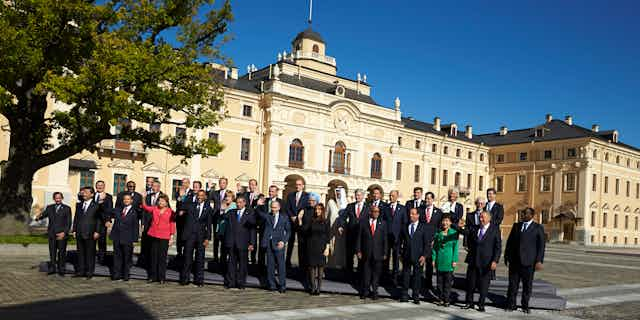Last orders at the G20 Summit and the press narrative here solidified around “the grumpy summit” and “economic agenda hijacked by Syria” headlines. A Russian official may or may not have alleged the UK was “a small island no one listens to”, lighting up Twitter and the British tabloids. We are fortunate the “family photo” taken earlier did not end in fisticuffs.
In all this, the achievements and progress of last year’s G20 have been lost. The leaders’ declaration and action plan were released along with a fifth anniversary Vision Statement. Several other documents deal with shadow banking, transparency in regional tax agreements, corporate tax evasion and long-term investment financing.
In the vision statement there appears the new formulation of “inclusive growth” which is shorthand for a more equitable distribution of growth, and reflects more social focus from the G20 in response to long-held demands:
The coordinated response of the G20 helped to avert a global depression and clearly demonstrated the Group’s value as a coordinating body for economic crisis management. Going forward, the G20 will build on this success and will continue to play a critical role in the global economy, by developing a common understanding of the new challenges we face and coordinating our actions to overcome them. Although the acute phase of the crisis is behind us, our determination to work together to achieve strong, sustainable, balanced and inclusive growth is unabated.
The international press pack here in St Petersburg is a story in itself. The media centre is dominated by US and European outlets and acts like a big, glossy echo-chamber, serving up what is doled out by the host. This is traditional media territory focused on pictures; there is very little engagement with new media or analysis, with some exceptions.
Body language analysis seems more important than reading the actual communiques and analysing briefings, the world experts here are under-utilised for comment and context. As a result, many global media consumers might think the G20 was a Syria conference to discuss airstrikes. Perhaps they are faintly puzzled as to why the IMF was invited.
The G20 troika needs to put serious effort into explaining in clear accessible terms what the G20 is, how it works, and what it is supposed to achieve.
But back to the content. There is always the risk that when the leaders of 19 high-powered countries, their guests and international and regional organisations such as the EU meet, the “high politics” of security will trump what is still seen as the “low politics” of economic coordination and transnational regulation.
Last night, the working dinner was supposed to focus on the UN Secretary-General updating leaders on progress towards developing a new set of global goals to end poverty, replacing the millennium development goals that finish in 2015. We are talking about deciding a baseline for what it means to be human in the next 20 years, setting targets and measuring them.
At first I was sceptical that the G20 Summit should consider this crucial UN agenda, but never in my wildest dreams did I imagine it would be bumped off by a war cabinet on Syria in which the Pope intervened. The secretary general made a fine speech, and in the end nothing was agreed.
In a side meeting of eight members (United Kingdom, the US, France, Italy, Japan, Saudi Arabia, Canada, Turkey plus the UN) today, Australia’s foreign minister Bob Carr obtained support for his long-standing campaign for a medical pact in Syria to protect doctors and health workers. European actors pledged more aid for Syria. This is a good achievement, but it is hard to know what it means in practice unless this agreement is somehow transferred to the Security Council or made part of a new peace plan. The G20 generally is useful for discerning where there is agreement on issues that can be carried forward in other forums, so this consensus is worth building.
Don’t get me wrong, Syria needs as much critical attention at the highest levels as it can get. A massive humanitarian crisis, a displacement tragedy, possibly genocide, there is no diplomatic frame in which Syria does not deserve discussion, as many humanitarian agencies here at the summit point out. But I fear the precedent of adding a security issue to the already over-burdened agenda of an economic grouping with no legal legitimacy.
Putin argued the Syria crisis has economic consequences for energy price volatility, but in my view this is a long bow to draw. All conflicts have devastating economic consequences, some hold more strategic import in geo-political terms than others. This is not for an informal grouping such as the G20 to judge. The security council has enough issues of its own without adding another layer of dysfunctional politics to the mix. The discussion should have been held, but quarantined more clearly from the official agenda.
The G20 works by holding a year-long series of technical and ministerial-level meetings, chaired by the previous, present and future host (Mexico, Russia and Australia). There is still hope that there will be progression on the economic issues where the G20 derives legitimacy from, as it represents 85% of the world’s economic output.
Syria discussion will switch back to a UN framework, possibly under a new peace process, and the next big moment will be leaders’ week at the UN General Assembly in late September.
And in December, when Australia’s year as G20 host nation begins, all eyes will turn to Brisbane and the November 2014 summit. The good news is that the bar for success has been lowered. Simply getting everyone to stick to the agenda would be an achievement.

